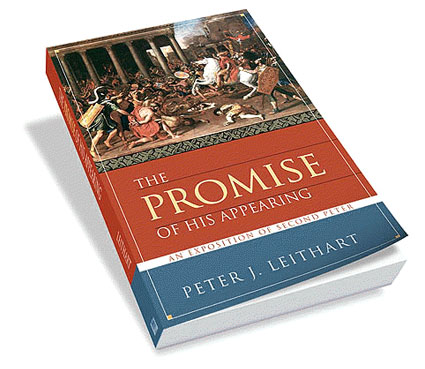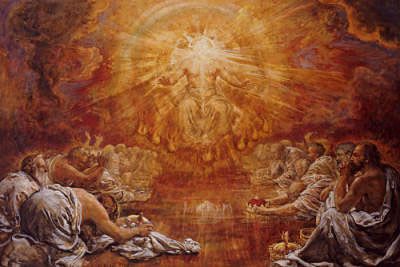Sep
10
2009
 God’s one Law for Adam was temporary. He could eat from the Tree of Judicial Knowledge when mature enough to carry the responsibility. God’s food laws for Israel were also temporary. [1] When the Christ came, and the people of God was brought to maturity, this restricted menu, too, was done away with. It was designed to be outgrown. Not many theologians understand this process of Adam’s “historical maturity”, so they come up with other theories to explain why many Bible truths are not “timeless”. Peter Leithart discusses comments by John Polkinghorne this week:
God’s one Law for Adam was temporary. He could eat from the Tree of Judicial Knowledge when mature enough to carry the responsibility. God’s food laws for Israel were also temporary. [1] When the Christ came, and the people of God was brought to maturity, this restricted menu, too, was done away with. It was designed to be outgrown. Not many theologians understand this process of Adam’s “historical maturity”, so they come up with other theories to explain why many Bible truths are not “timeless”. Peter Leithart discusses comments by John Polkinghorne this week:
Continue reading
Comments Off | tags: Gnosticism, Liberal theology, Peter Leithart | posted in Biblical Theology, Quotes
Sep
8
2009

Matthew 1-10 follows the Dominion pattern. After Jesus’ testing in the wilderness, in 4:18-8:13 Jesus called His disciples and began mustering a new holy army – the “next generation”.[1] It was reported to Him that the last Old Covenant Nazirite (holy warrior) was dead. It was time for new warriors. Jesus healed the uncleanness of many, creating a new priesthood. His success in the wilderness as a new Head made possible this new body. Peter Leithart writes:
Continue reading
Comments Off | tags: Atonement, Bible Matrix, Demons, Dominion, High Priest, John the Baptist, Leviticus, Nazirite, Peter Leithart, Totus Christus | posted in Biblical Theology, Totus Christus
Sep
2
2009

“Look now toward heaven, and count the stars if you are able to number them.” And He said to him, “So shall your descendants be.” And he believed in the LORD, and He accounted it to him for righteousness.
—Genesis 15:5-6
Abraham didn’t sleep in on the day he was to take his beloved son, his only son, to Moriah, kill him and offer him as an ascension. He got up early. By this stage in the narrative, Abraham had been tried and tested many times, but this seems just a little too keen.
Continue reading
Comments Off | tags: Abraham, Covenant Theology, Doug Wilson, Faith, Hebrews, Isaac, Martyrdom, Peter Leithart, Ray Sutton | posted in Christian Life
Aug
20
2009

Peter Leithart writes:
Matthew quotes Isaiah 53:4 to explain how Jesus removes illness and uncleanness (Matthew 8:17). Jesus radiates life, and that life heals the sick and raises the dead. Jesus also accepts death and uncleanness on Himself, to be borne away on the cross. Continue reading
Comments Off | tags: Culture, Peter Leithart, Temple | posted in Quotes
Aug
16
2009
From Peter Leithart’s blog today, supporting a preterist interpretation of Romans 9-11:
Continue reading
Comments Off | tags: AD70, Peter Leithart | posted in The Last Days
Aug
7
2009
or Having No Controversies With God

The devil hates confession. It breaks his power over us. He would rather have us confine ourselves behind the bars of our own private Sheols than get right with God.
Why is confession so powerful? Because it is judicial. It is an application of the knowledge of good and evil. Continue reading
6 comments | tags: Bathsheba, David, Feasts, James Jordan, Nathan, Peter Leithart, Saul, Solomon, Systematic typology | posted in Biblical Theology, Christian Life, Quotes, Totus Christus
Jul
27
2009

———————————————————————————
“…preterism is not merely a way of interpreting New Testament prophecy but also provides a framework for understanding New Testament theology as a whole.”
———————————————————————————
The Bible was written for us, not to us. This includes the New Testament. We have evangelicals who take both Old and New Testament prophecies concerning Israel and mistakenly apply them to modern Jews (dispensationalism). But then we also have evangelicals who think that the imminent predictions of judgment throughout the New Testament are still somehow “imminent.” This includes most conservative Christian theologians (even smart guys like D. A. Carson), who treat the epistles as though they were written to us. They make the same error as the dispensationalists, albeit on a smaller scale. This misreads the New Testament. It replaces interpretation with application, and unwittingly makes many verses unnecessarily mysterious to modern Christians. Continue reading
2 comments | tags: Dispensationalism, Hermeneutics, Old Testament, Peter Leithart, Revelation | posted in Against Hyperpreterism, Biblical Theology, The Last Days
Jul
17
2009
or Global Warning

An important tenet of James Jordan’s interpretation of the Revelation is that it shows the Old Covenant angelic government vacating the premises and a human government moving in as a new administration – in AD70. This sounds strange to our ears, but I have found that it does play out in many ways, which it should if it is the correct interpretation.
Now, this handover of heavenly government was a gradual process in the first century, but consummated at the marriage feast of the Lamb. But its outworking in history is gradual. Interesting stuff. Here’s some thoughts.
Continue reading
Comments Off | tags: AD70, Angels, Demons, Nazirite, Peter Leithart, Revelation | posted in Against Hyperpreterism, Biblical Theology, Quotes, The Last Days
Jul
10
2009
Can trying to be relevant make a Christian irrelevant? John Piper writes:
Continue reading
Comments Off | tags: Culture, John Piper, Peter Leithart, Spurgeon | posted in Christian Life, Quotes
Jul
9
2009

or Why Are We Baptizing the Dead?
Peter Leithart writes concerning baptism:
“In Genesis 9:11, Yahweh promises not to “cut off flesh” by water. That is the covenant with Noah.
A few chapters later, Yahweh tells Abram that he must cut off the flesh of all male children of Israel, not by water but by a knife.
Continue reading
2 comments | tags: Adam, Baptism, Circumcision, Federal Vision, John Piper, Noah, Peter Leithart, Systematic typology, The flood | posted in Christian Life
 God’s one Law for Adam was temporary. He could eat from the Tree of Judicial Knowledge when mature enough to carry the responsibility. God’s food laws for Israel were also temporary. [1] When the Christ came, and the people of God was brought to maturity, this restricted menu, too, was done away with. It was designed to be outgrown. Not many theologians understand this process of Adam’s “historical maturity”, so they come up with other theories to explain why many Bible truths are not “timeless”. Peter Leithart discusses comments by John Polkinghorne this week:
God’s one Law for Adam was temporary. He could eat from the Tree of Judicial Knowledge when mature enough to carry the responsibility. God’s food laws for Israel were also temporary. [1] When the Christ came, and the people of God was brought to maturity, this restricted menu, too, was done away with. It was designed to be outgrown. Not many theologians understand this process of Adam’s “historical maturity”, so they come up with other theories to explain why many Bible truths are not “timeless”. Peter Leithart discusses comments by John Polkinghorne this week:































